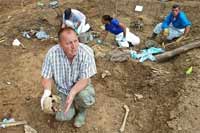Whereabouts of mass graves in post-war Bosnia can be found for money
For a few hundred dollars, Hasan Nuhanovic learned that his mother managed to fatally slice open her veins moments before six armed men burst into her jail cell near the end of the Bosnian war.

For a few hundred more, he hopes to find out where she is buried.
Thirteen years after Bosnia's 1992-95 war - a conflict that killed more than 100,000 people - forensics experts are still uncovering mass graves and exhuming bodies moved to secret locations by war criminals trying to conceal their atrocities.
How do they know where to dig?
Those involved say some locations are revealed by witnesses who come forward without asking for any reward. But some want cash - anything between a few dollars to tens of thousands - or favors such as building materials or help getting a visa for a Western country.
Officials say one man agreed to provide information about the location of a mass grave after he was promised a new microwave oven.
"Currently we are negotiating with a man who is asking for 20,000 euros ($31,400) for the location of a mass grave that may contain 1,100 bodies," said Munira Subasic, head of the Mothers of Srebrenica - an association of widows and mothers of victims of Europe's worst slaughter of civilians since World War II.
Usually the deal is done through mediators who get a precise description of a location, or the informant drives to the scene under cover of darkness and tosses a marker on the site, Subasic said. Forensics experts are then alerted, and they start to dig.
Murat Hurtic, who heads a team that has uncovered 97 mass graves in northeastern Bosnia, said most of his information comes from the families, and some directly from witnesses. Hurtic said experts have learned to trust what those who want to help have to say.
Often, he said his team digs at a hinted location and finds nothing. Then locals wander by and whisper, "more to the left," or make a gesture that guides the diggers to the correct site.
"Many people find it hard to live with the secret while they know how many people are crying," he said.
"Some Serbs approach us and say, 'We are not all the same, you know. Dig further down the slope.' They do this discreetly."
Once the bodies are exhumed, they are brought to a lab where DNA is extracted and checked against a database containing more than 100,000 samples taken from the blood of relatives of the missing. If a match is found, the remains are returned to the family for burial.
Although experts have uncovered hundreds of mass graves and have exhumed more than 16,000 bodies since the war, Bosnian officials say they are still seeking the remains of 13,500 people.
That means they must rely on survivors like Nuhanovic, 40, who began his search to discover the fate of his parents and brother by visiting markets on the former front lines, looking for Serbs who might know something.
The last time he saw his loved ones was in July 1995, when Dutch U.N. peacekeepers ordered his family to leave the U.N. compound in Srebrenica. Friday marks yet another grim anniversary of the massacre there.
Srebrenica was supposed to be a U.N. "safe haven," and nearly 40,000 Muslim Bosniaks gathered to clamor for protection after Bosnian Serbs captured the town.
But the 600 Dutch peacekeepers, outnumbered and outgunned, were unwilling or unable to stop Serb forces led by Gen. Ratko Mladic from separating the men and boys from the women and girls. Up to 8,000 males were executed over five days, and their remains were scattered in mass graves that are still turning up today.
"Dad's body was uncovered, but I am still looking for my brother's," Nuhanovic said solemnly.
An informant told him his mother was taken to a jail in nearby Vlasenica after she had to leave the U.N. base. There, she committed suicide to avoid torture.
"I'm now negotiating to find out where she was buried," he said.
Officials say this quiet trade apparently has gone on since the end of the war.
Amor Masovic, who helps head the Commission of Missing Persons, said that over the years his employees have even used their per diems to get information because the commission has never had enough funds to give large cash rewards. Masovic acknowledged there have been many instances of people falsely claiming to have information on a grave.
"Our practice is to get information first and pay when we make sure it's not false," he said.
Subasic, the leader of the Srebrenica victims' group, has pressed the government to set up a fund to help families get the information they need.
Subasic said she would sell her own home if she knew the proceeds would be used to find her slain son's bones.
"Over 13,000 still missing," she said. "Multiply that with at least four family members. That's how many people are crying every day."
Subscribe to Pravda.Ru Telegram channel, Facebook, RSS!




